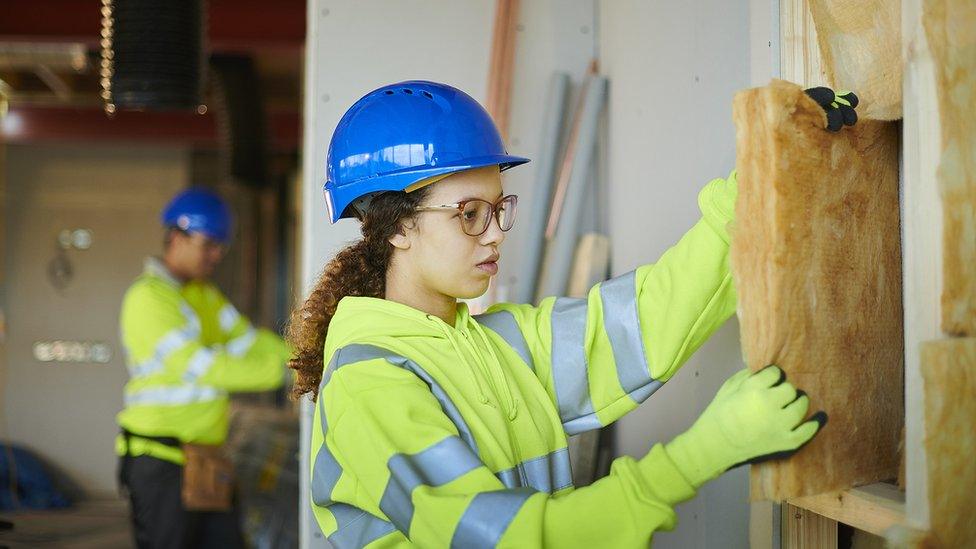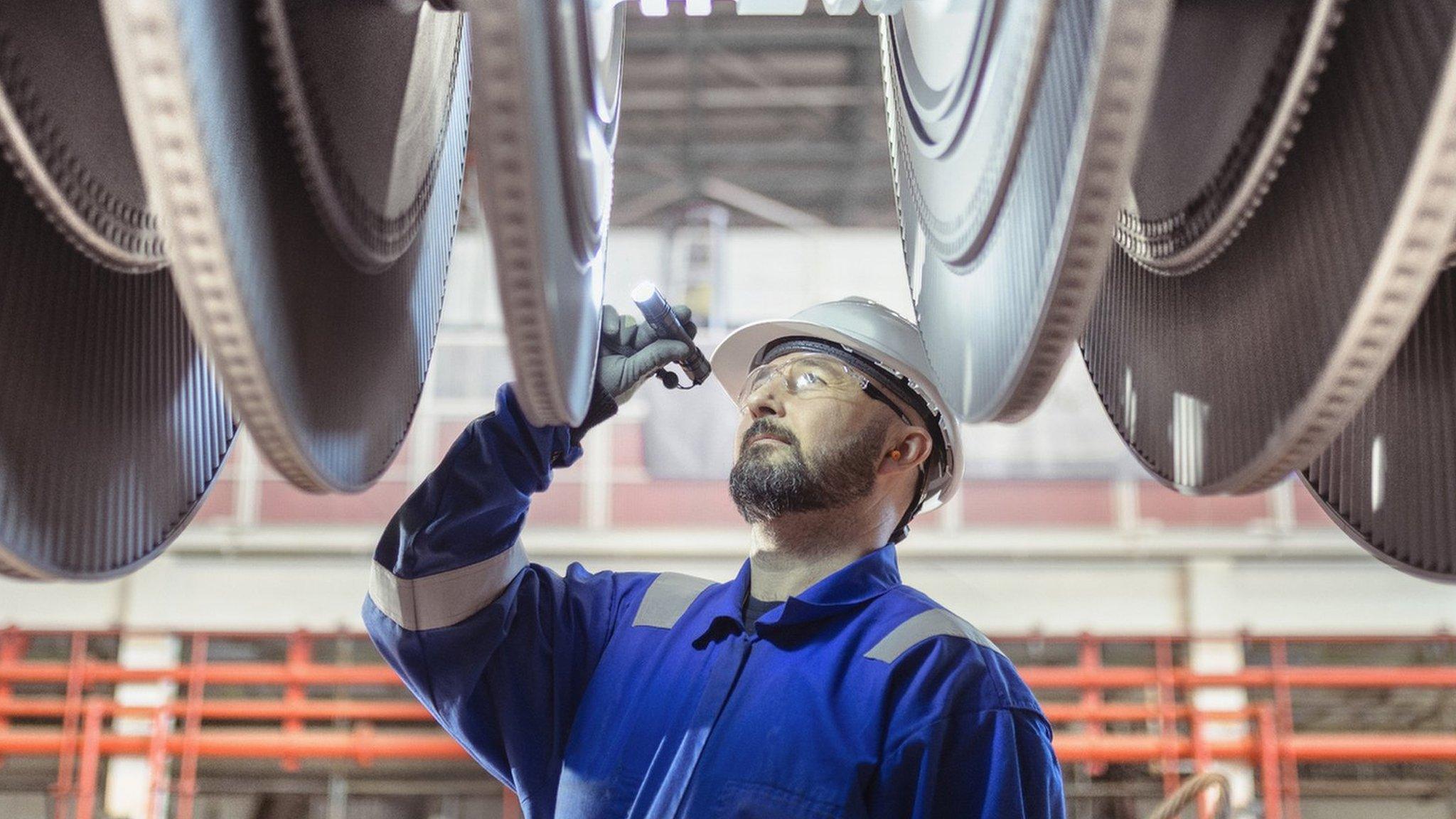Energy strategy: UK plans eight new nuclear reactors to boost production
- Published
- comments
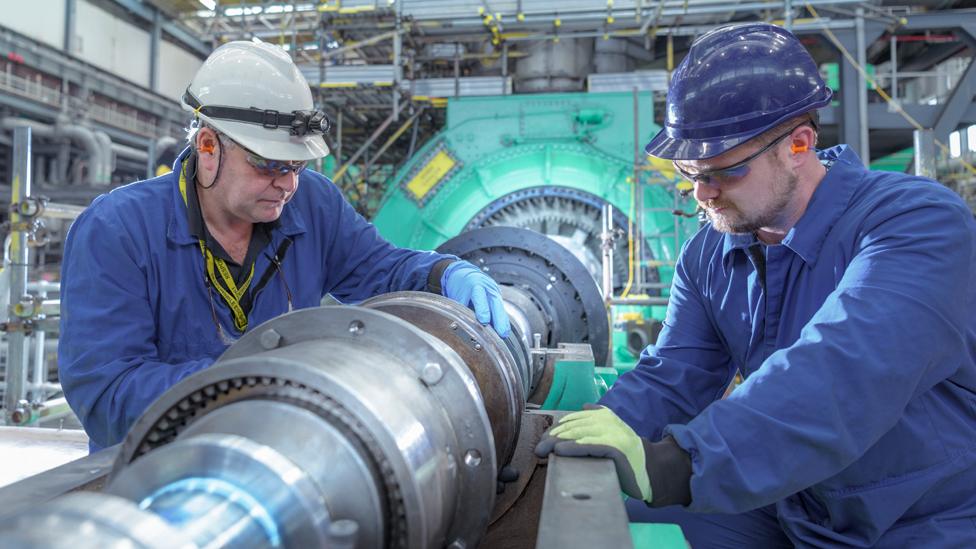
Up to eight more nuclear reactors could be approved on existing sites as part of the UK's new energy strategy.
The strategy, which aims to boost UK energy independence and tackle rising prices, also includes plans to increase wind, hydrogen and solar production.
But experts have called for a bigger focus on energy efficiency and improving home insulation.
Consumers are facing soaring energy bills after the Russian invasion of Ukraine pushed gas prices even higher.
Under the government's new plans, external, up to 95% of the UK's electricity could come from low-carbon sources by 2030.
It outlines, for example, the hope of producing up to 50 gigawatts (GW) of energy through offshore wind farms, which the Department for Business, Energy and Industrial Strategy (Beis) said would be more than enough to power every home in the UK.
The government's energy strategy has been much-delayed, with one of the big points of contention reported to have been the construction of onshore wind turbines.
Key points of the new energy strategy
Nuclear - The government plans to reduce the UK's reliance on oil and gas by building as many as eight new nuclear reactors, including two at Sizewell in Suffolk. A new body will oversee the delivery of the new plants.
Wind - The government aims to reform planning laws to speed up approvals for new offshore wind farms. For onshore wind farms it wants to develop partnerships with "supportive communities" who want to host turbines in exchange for guaranteed cheaper energy bills.
Hydrogen - Targets for hydrogen production are being doubled to help provide cleaner energy for industry as well as for power, transport and potentially heating.
Solar - The government will consider reforming rules for installing solar panels on homes and commercial buildings to help increase the current solar capacity by up to five times by 2035.
Oil and gas - A new licensing round for North Sea projects is being launched in the summer on the basis that producing gas in the UK has a lower carbon footprint than doing so abroad.
Heat pumps - There will be a £30m "heat pump investment accelerator competition" to make British heat pumps which reduce demand for gas.


Environmentalists and many energy experts have reacted with disbelief and anger at some of the measures in the strategy.
They cannot believe the government has offered no new policies on saving energy by insulating buildings.
They say energy efficiency would immediately lower bills and emissions, and is the cheapest way to improve energy security.
A Downing Street source said the strategy was now being seen as an energy supply strategy.
Campaigners are also furious that ministers have committed to seeking more oil and gas in the North Sea, even though humans have already found enough fossil fuels to wreck the climate.
There is a strong welcome, though, for the promise of more energy from wind offshore with speedier planning consent.
The same boost has not been offered to onshore wind.
The decision to boost nuclear has drawn a mixed reaction. Some environmentalists say it's too dear and too dangerous. They ridicule the idea from some politicians that every city could have its own mini reactor.
But other climate campaigners believe nuclear must be part of the energy mix.

Nuclear plans
The new strategy says the government wants to "lead the world once again" in nuclear power, reversing what it describes as "decades of underinvestment".
The government announced that a new body called Great British Nuclear will be launched to bolster the UK's nuclear capacity, with the hope that by 2050 up to 24 GW of electricity will come from that source - 25% of the projected electricity demand.
The focus on nuclear could deliver up to eight new reactors to be built on existing sites.
The government hopes to have a new reactor approved each year until 2030 with the aim to have them up and running by 2050.

It also confirmed advanced plans to approve two new reactors at Sizewell in Suffolk during this parliament.
Wylfa in Anglesey and Oldbury in South Gloucestershire have also been named as candidates to host either large-scale plants, smaller modular nuclear reactors, or possibly both. The Great British Nuclear body will identify other appropriate sites.
Tom Greatrex, boss of the Nuclear Industry Association, said the plans marked a "vital step forward" for the UK to meet its climate goals, and could create thousands of jobs.
"The ambition and determination to do much more and quicker is very welcome," he said.
The government said it would reform planning rules to cut approval times for new offshore wind farms, with the ambition that by 2030 more than half of the UK's renewable capacity will be wind.
For onshore wind, the strategy commits to consulting on developing partnerships with "a limited number of supportive communities" who want to host wind turbines in exchange for guaranteed lower energy bills.
However, the strategy says there will be no "wholesale changes" to current planning regulations for onshore wind.
Although it is one of the cheapest forms of energy, new onshore wind projects have been declining since 2015 when the government ended subsidies and introduced stricter planning rules in response to some complaints that wind turbines were an eyesore and noisy.
Defending the decision not to prioritise onshore wind, Prime Minister Boris Johnson said the UK already had about 30GW of onshore wind capacity.
Speaking at the Hinkley Point C nuclear power plant, he said onshore wind farms were "controversial" because of their visual impact and new sites "will have a very high bar to clear".
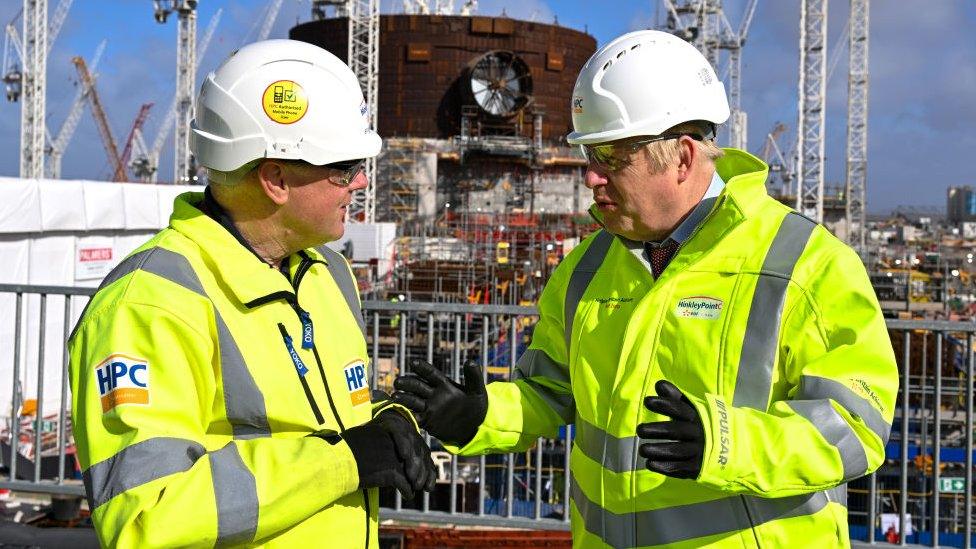
The prime minister visited the Hinkley Point C nuclear power station in Somerset on Thursday
Mr Johnson said the strategy was about "tackling the mistakes of the past and making sure that we are set well for the future".
Citing policies including a £6bn energy efficiency fund and support for heat pumps, he said the government was "already doing a huge amount to help people with the immediate cost of living and of course we are going to do more".
But Labour leader Sir Keir Starmer criticised the strategy as "too little" and "too late" to help people with rising costs.
"All we've got today is a cobbled-together list of things that could and should have been done over the last 10 to 12 years and it doesn't even tackle really important things like insulating homes, which could save £400 on everybody's bill," he said.
Green Party co-leader Adrian Ramsay said it "did not serve the needs of people or the climate".
Mr Ramsay suggested that if the government was "concerned about energy bills and taking real climate action, it would be going even further on onshore wind".
Liberal Democrat leader Sir Ed Davey described the plans as "utterly hopeless", while the SNP's Stephen Flynn called it a "missed opportunity".
Former Ofgem boss Dermot Nolan said: "Most of these decisions will take a long time to have an impact and in the short run we will continue to be dependent on fossil fuels."
He said the lack of focus on energy efficiency, on insulation, on improving the quality of people's homes "is an opportunity missed".
Dr Simon Cran-McGreehin, head of analysis at the Energy & Climate Intelligence Unit said: "This is an immediate problem that needs solutions now, and this doesn't do anything on prices."
"It tries to do some things on energy supply, but they're all medium to long-term measures. So it does seem to fail the exam question," he added.

- Published7 April 2022
- Published7 March 2022
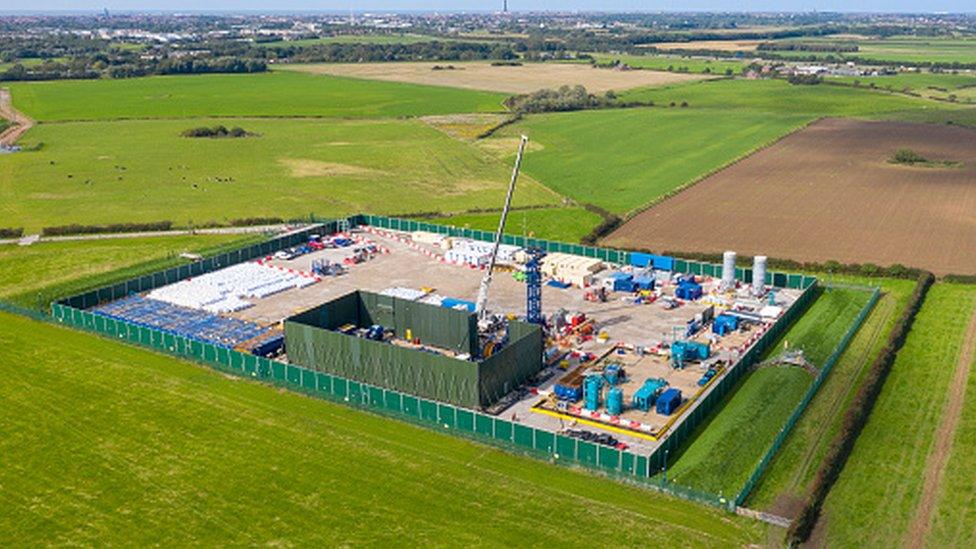
- Published3 April 2022
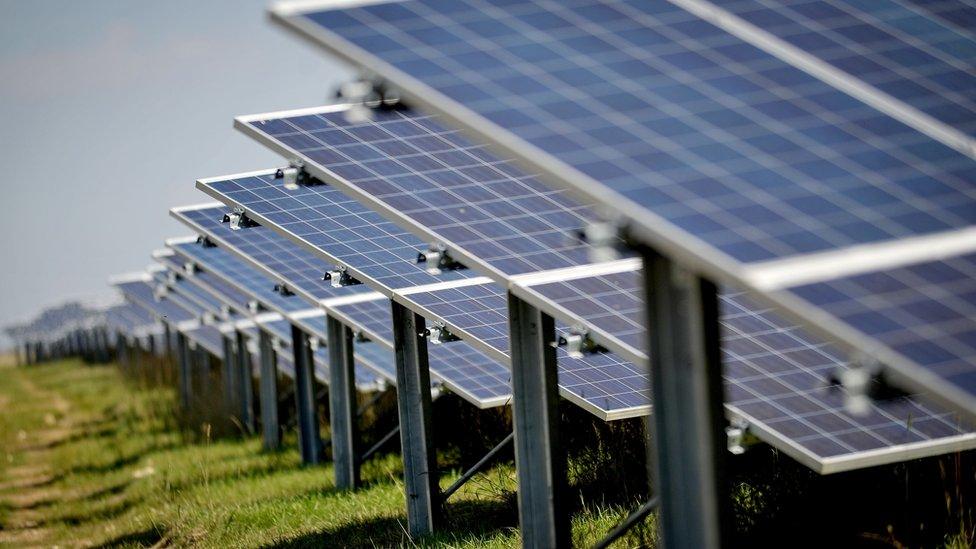
- Published28 November 2022
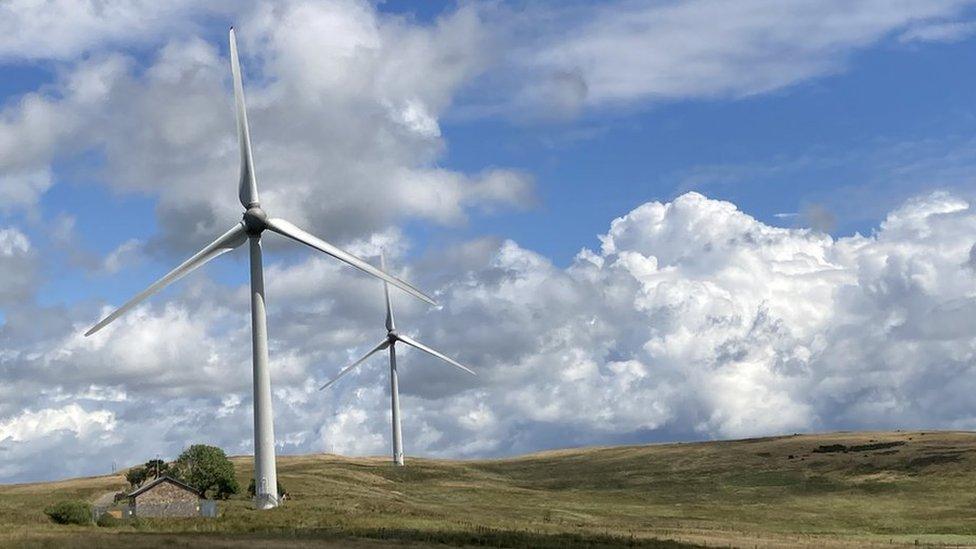
- Published26 January 2023
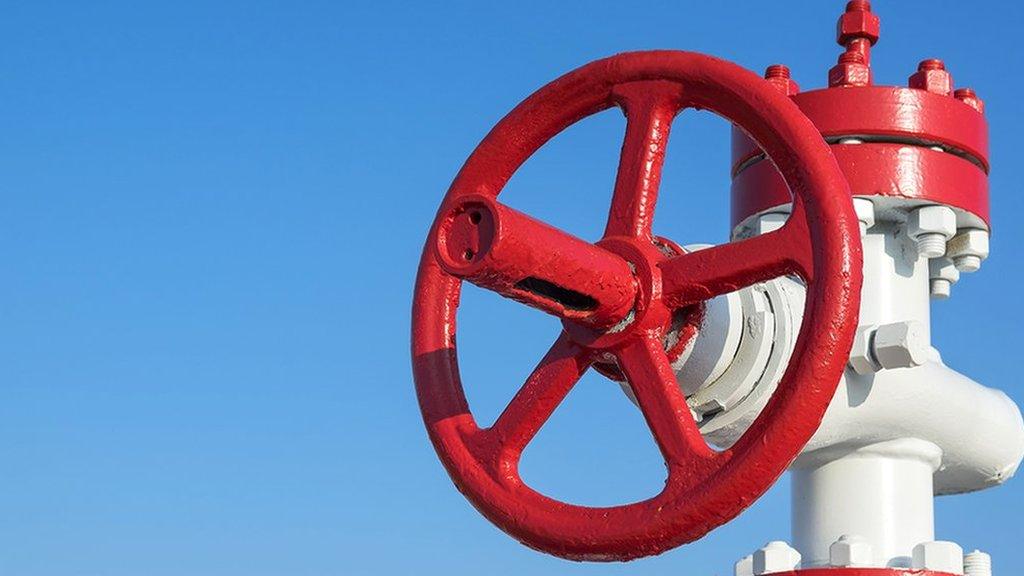
- Published11 March 2022
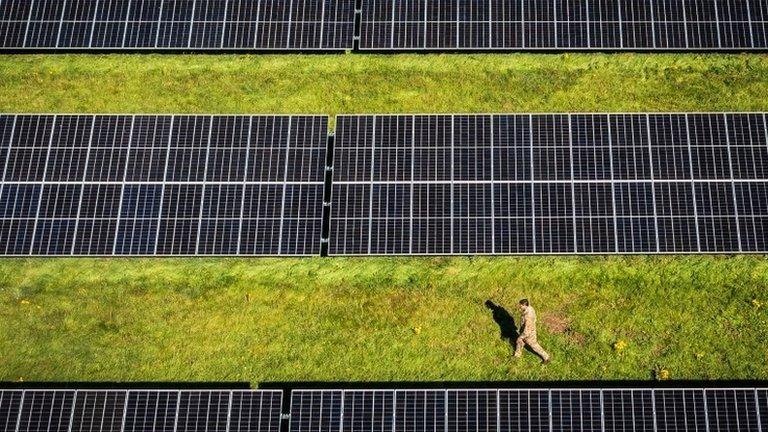
- Published4 November 2021

- Published28 November 2022
